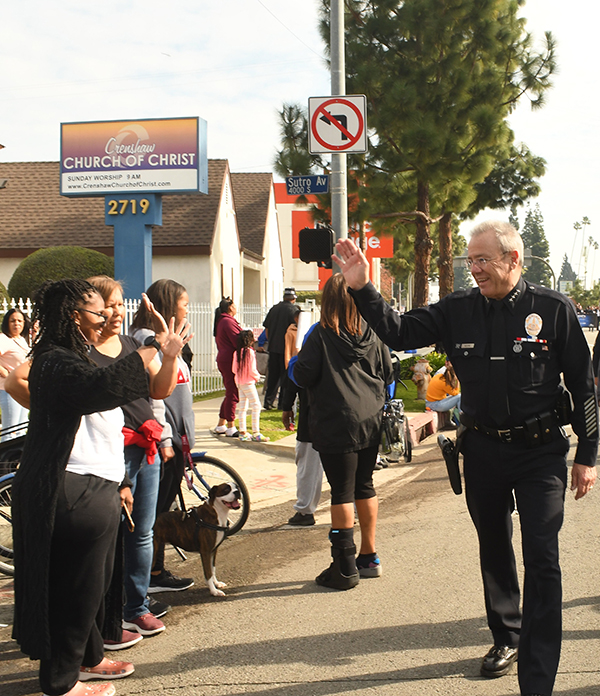By Earl Ofari Hutchinson
Contributing Columnist
Mayor Karen Bass has both the enviable and the unenviable task of picking the next Los Angeles police chief. The dual task fell on her shoulders when current Chief Michel Moore announced his mid-term retirement in February.
The enviable part of her task is that it will give her the chance to pick a chief who can carry out the mandate that she and many other LAPD watchers want and need.
That leads me to the unenviable task. She’ll have to revisit that mandate, but not just revisit it, make sure that whoever she ultimately picks for the post fulfills that mandate. The mandate in two words is total reform.
That’s total reform from top to bottom in a department that for much of its past history was the much-deserved poster agency for the most abusive, brutal, “us versus them,” racially bigoted big city police department in the nation.
In the decades since the beating of Black motorist Rodney King in 1991 and the L.A. riots in 1992 there has been much hand-wringing and soul-searching over how to reform the LAPD, complete with investigations, commissions, voluminous reports, city charter changes, a federal consent decree and the appointment of two reform-minded chiefs.
The aim of all of this was to transform the LAPD into a clean, efficient, community-oriented police department. It was more than a case of image makeover. It was a desperate need for a profound course correction in the way the LAPD did business.
The changes were soon visible. Successive LAPD chiefs disciplined, suspended and fired officers for misconduct. The use of force by officers dropped. Citizen complaints leveled off.
LAPD officials became constant presences at community events, meetings and forums, always pushing partnership and dialogue with community leaders. There were aggressive policy changes by the Los Angeles Police Commission, the civilian oversight agency, and the LAPD inspector general. None of these things would have had the remotest chance of happening a decade earlier.
Though LAPD top brass continued to loudly protest that racial profiling didn’t exist despite legions of racially based complaints against the department, there was still the sense that the LAPD had turned the corner. Polls showed that more Blacks than ever expressed guarded support for the LAPD.
Yet, while the LAPD has clearly continued the reform process, there are still some of the old troubling signs that much more still needs to be done, especially when it comes to the most volatile issues — and that’s the use of deadly force, the wildly disproportionate traffic and pedestrian stops of Blacks and Latinos, the patrol saturation of mostly Black and Latino neighborhoods, and questions about how tough and effective disciplinary measures are against officers guilty of misconduct. That includes suspension, firing and, where warranted, a recommendation for prosecution.
Officers who overuse deadly force or commit acts of misconduct must be punished. Without that, it reinforces the notion that officers can administer street corner justice. That is the practice that got the LAPD into so much hot water in years past.
There’s more. The slaying of George Floyd n 2020 ignited mass marches, protests, demonstrations and civil disturbances. It prodded every political leader, including even President Donald Trump, to speak out on the slaying.
The slaying ignited a deep soul search, once again, on the continued cheapness of Black lives and how cavalierly and wantonly some cops and some departments continue to extinguish them.
Unfortunately, what the Floyd slaying didn’t do, or certainly do enough of, was force police departments to go full bore to purge the culture of silence from their departments. LAPD officials, the L.A. Police Commission, and even the L.A. Police Protective League have repeatedly denounced and promised to crack down on the blue code of silence. There are rules and regulations in place that mandate that officers who witness any abusive, and yes, racist acts, by other officers challenge them and report them.
Here’s how deep, prevalent and terrifying the blue code of silence continues to be in police culture. The National Institute of Ethics, in a study commissioned by the International Association of Police Chiefs surveyed hundreds of cops in 21 states. They found that nearly 80% of cops said that a code of silence exists, more than half said it didn’t bother them, almost half admitted that the code was strongest when excessive force was used, and half also admitted they had witnessed misconduct by another officer but kept their mouths shut about it.
The problem is that few police departments pound this point home to rank and file officers or for that matter to their superiors. Put bluntly, telling them, and continuing to tell recruits at the academy, officers in orientation and training sessions, and in their performance evaluations that the department has zero tolerance toward police misconduct. That if an officer witnesses it, they are duty-bound to report it.
If they don’t, they are just as guilty of law breaking as the cop that breaks the law. This is a huge problem area that still needs much work within the LAPD.
It’s the single biggest thing that jades minorities and increasingly much of the public toward cops, and reinforces the notion that all cops routinely lie, cheap and cover up abuses.
Reform, then, still must be the watchword for the LAPD. And that must start with the person whom Mayor Bass appoints to take over the LAPD top spot.
Earl Ofari Hutchinson is an author and political analyst. He is the host of the weekly Earl Ofari Hutchinson Show from 9 to 10 a.m. Saturday on KPFK 90.7 FM Los Angeles and the Pacifica Network.












